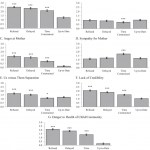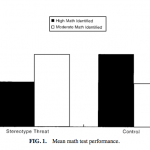social studies
I've discussed several times over the last several years my impression that the media have become in general less tolerant of antivaccine views. At least, the media seem less willing to indulge in "tell both sides" false equivalence. Back when I started blogging, I routinely used to bemoan how news stories about vaccines or autism would almost inevitably include obligatory quotes from antivaxer like J.B. Handley, Jenny McCarthy, and sometimes even Andrew Wakefield. More recently, over the last five years or so, such tropes seem a lot less common. I don't have any solid evidence to back up my…
I got a long email from one of the authors of the skull measuring study and I want to make some clarifications to my previous post. It seems that I was not as clear and thorough as I could have been in my argument.
First, my sincere apologies to all physical anthropologists and other researchers who routinely measure skulls that I may have offended with my off-hand comments. I did not intend to cast doubt on a whole field, and I am aware that there are lots of reasons to look at skulls besides comparing cranial capacity of different races, many of them very valuable to medicine and…
It's not every day that you read about measuring skulls in the contemporary scientific literature. It's kind of a quaintly old-timey, quaintly racist kind of thing to do. But here we are, with a brand new paper about skull measuring in PLoS Biology. Already quite a few blog-words have been written in support of this new paper, which disproves Stephen Jay Gould's assertion in The Mismeasure of Man that George Morton's 1839 skull measurements were fudged intentionally or unintentionally by his racist bias.
I haven't read a lot of Gould, and I'm pretty convinced by the numbers in the paper…
All the science blogs are talking about it. Where are all the female science bloggers? The question itself and the long lists of great bloggers who happen to be female bring up a lot of interesting questions about what makes a good blog, what is best for blog (self-)promotion, who is in what science blogging clique, what it means to write about "women's issues," and what it means to be a woman in science. But what these lists (and the blogs that they're on) highlight even more is just how homogeneous the community can be: Where are the non-white science bloggers? Where are the LGBTIQ science…
Nick pointed me to a fabulous podcast series by CBC radio called "How To Think About Science." Each episode is a long and fascinating interview with a prominent scholar of science--scientists, philosophers, sociologists, anthropologists, and historians who explore how science is done, how scientists work, and how scientific ideas and facts are communicated. Check it out!
iGEM officially starts for the Harvard team tomorrow for some good old-fashioned fun with BioBricks, arabidopsis, protein-based sweeteners, and shRNA! Our goal is to make a system for genetically engineering plants safely and easily with some hopefully fun and useful applications in the short term. iGEM (the International Genetically Engineered Machines competition) is about fun and open science, so we hope you enjoy following along with our adventure on our wiki, blog, twitter, or even become a fan on facebook. As a proud teaching fellow I'll be posting updates here periodically all summer,…
In the recent articles, blog posts, and comment threads about possible biological reasons for the continued gender disparity in tenured math and science faculty positions, the discussion seems to be divided between two groups: those who emphasize the social and cultural aspects involved in gender and intelligence, and those who emphasize the scientific evidence of standardized test performance. The science team rails against "political correctness," claiming that by questioning the merits and motives of scientific hypotheses of differences in innate intelligence between different groups of…
Unlike many of my colleagues, I'm not really interested in the whole "science vs. religion" thing, but I do want to point out the very thoughtful analysis of genetic engineering and synthetic biology by the Church of Scotland's Society, Religion, and Technology Project. On GM food, they write:
The official scientific and economic reports support the view of the 1999 Assembly, that GM is not a simple 'yes or no' issue and must be taken case-by-case, weighing up many different factors. Theologically, SRT has found no convincing reason to say it is a wrong act to transfer genes into a crop from…
My semester in MIT's course on Documenting Science Through Video and New Media has drawn to a close. I've had a wonderful time and learned a lot about how films and science are constructed by different people in different times for different reasons. Most of all I've learned about how challenging it can be to put together an interesting narrative and present a point of view while at the same time ensuring that the science being explained is honest and clear to everyone. I've recently gotten the chance to watch two great recent science documentaries outside of class, Naturally Obsessed and…
I got the chance to attend a panel discussion about science and the media presented by the UK-based charity Sense About Science. The audience was primarily scientists, many of whom were angry about how science is presented in the media: the outlandish claims, the hype, presenting "both sides" of stories where there is clear scientific consensus. The panel included a professional scientist who teaches about communicating with the public, an editor at the journal Cell, and a science reporter for the Boston Globe.
The panel was mostly about "traditional" media, with a little shout-out to blogs…
[Repost with minor modifications form gregladen.com]
width="250"/>
As indicated in a press release by the National Center for Science Education, the National Council for the Social Studies has released a position statement on Intelligent Design.
...There have been efforts for many decades to introduce religious beliefs about the beginning of life on Earth into the science curriculum of the public schools. Most recently, these efforts have included "creation science" and "intelligent design." Following a number of court decisions finding the teaching of creationism and intelligent design…


